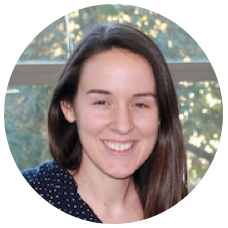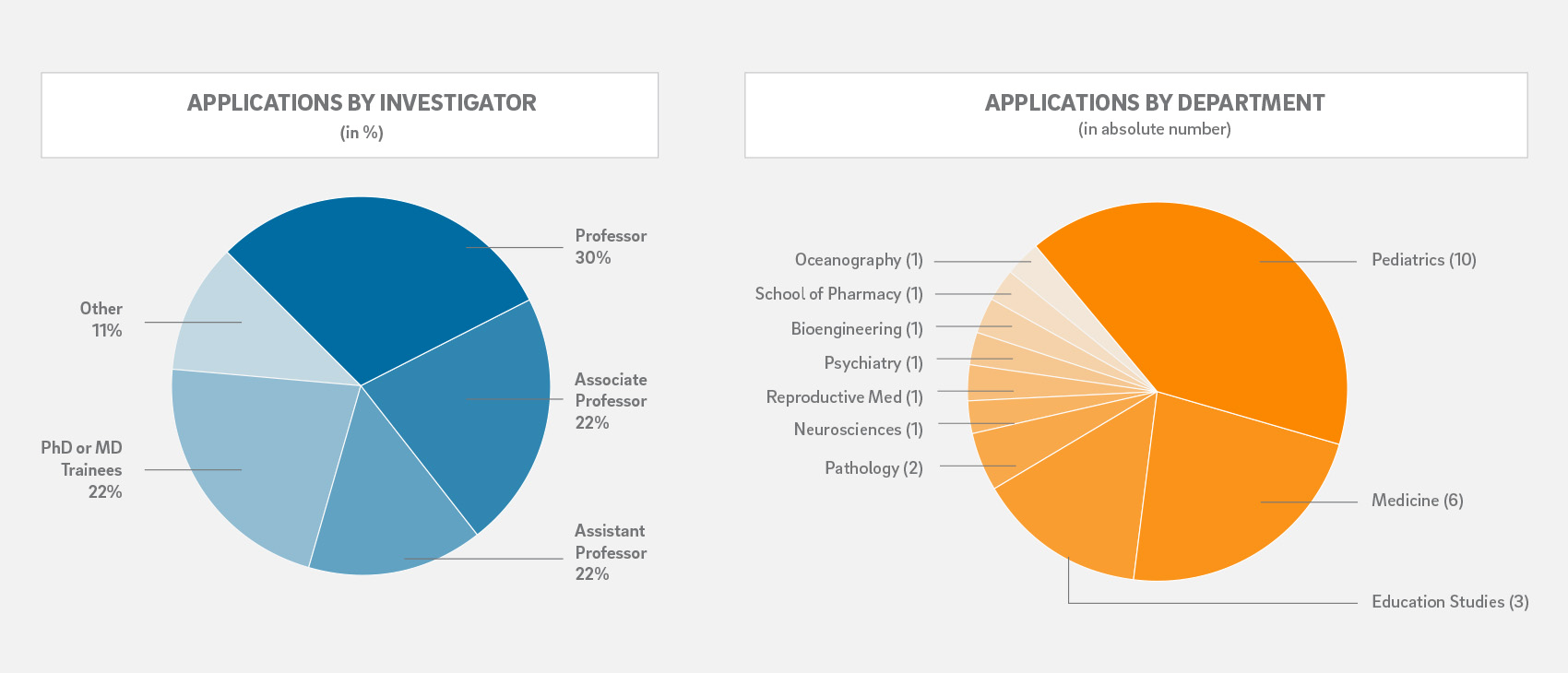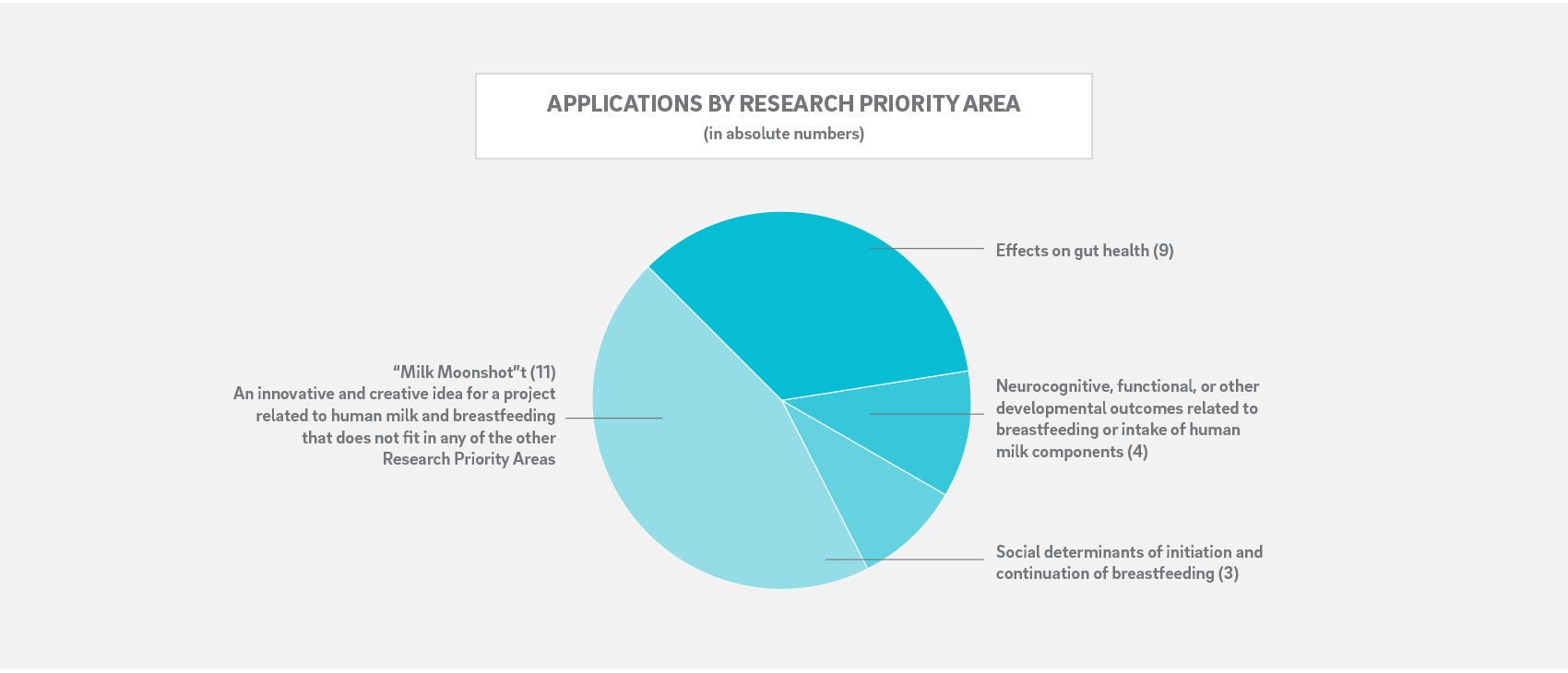2018 MOMI Seeds
Page Content
The first request for MOMI Seeds pilot grant proposals closed on October 15, 2017, and we received a total of 27 applications, highlighting the immense interest in and potential for human milk and lactation research at UC San Diego and emphasizing the high demand for additional funding in this critical line of research.
27
| Number of Applications Submitted
|
$200,000
| Research funds awarded
|
4
| Number of awards granted
|
2018 Awardees

| John Chang, MDAssociate Professor, Department of Medicine
"Using single-cell RNA-sequencing to elucidate effects and mechanisms of osteopontin on gut health and immunity" Osteopontin is a protein in human milk that has been shown to have beneficial effects on the immune system. What remains incompletely understood, however, is how osteopontin mediates these beneficial effects on the mucosal and system immune systems. In this project, we will use a cutting-edge technique called 'single-cell RNA-sequencing' that enables us to analyze the detailed instructions in an individual cell, thousands of cells at a time. If successful, this project will provide new insights into how one component of human milk, osteopontin, mediates its beneficial effects and provide the foundation for the investigation of many other components of human milk. Dr. Chang’s research group investigates basic immune mechanisms underlying lymphocyte fate determination in the context of infectious diseases and autoimmunity. His laboratory also conducts translational studies in human patients to better understand the mucosal immune system in health and disease. The overall goal of Dr. Chang’s research program is to make fundamental discoveries that have the potential to result in new approaches to human health problems.
|

| Lars Eckmann, MDProfessor, Department of Medicine
"Control of intestinal microbiome and gut physiology by human milk oligosaccharides" Human milk not only nourishes babies with conventional nutrients such as fats and milk sugar, but also contains many other components that benefit the infant beyond providing energy. Among these are unusual sugars called human milk oligosaccharides (HMOs), which are the third most abundant components of breast milk (after fats and normal milk sugar lactose), but do not directly contribute to the growth of the baby. To understand the health-promoting functions of these important milk components, this pilot project will utilize rodent models to conduct innovative studies to determine how HMOs can affect the number, composition and function of the normal bacteria that colonize the gut of healthy babies. Dr. Eckmann received his MD training at the University of Hamburg, Germany, conducted graduate research at the Beatson Institute in Glasgow, UK, and is now Professor of Medicine at UC San Diego. His research focuses on different aspects of immunology and infectious diseases in the gastrointestinal tract and other mucosal organs, ranging from mechanistic studies of immune responses in cell culture and rodent models to the development of novel antimicrobial drugs and vaccines.
|

| Martina Wallace, PhDProject Scientist (PI: Christian Metallo, PhD), Department of Bioengineering
"Determination of the location of branched chain fatty acids (BCFAs) in the breast milk lipidome and their impact on microbiota composition" Breast milk contains a complex mixture of nutrients required for healthy development and growth, and the fatty acid composition of milk is an important aspect of this. Branched chain fatty acids (BCFAs) are an abundant component of milk but their physiological function is not well understood. This study will focus on the regulation of BCFA synthesis, what purpose they serve in breastmilk production and their influence on infant microbiota composition. Overall, these studies will establish novel links between BCFAs, gut development, and infant health while generating fundamental insights into BCFA function in breast milk. Dr. Wallace is a project scientist in Christian Metallo’s lab in the department of Bioengineering, UC San Diego. She received her B.Sc. in Biochemistry from University College Dublin in 2007 and her Ph.D. in 2011 from the School of Agriculture and Food Science, University College Dublin where her research focused on the use of metabolomics in assisted reproductive technologies. She joined Dr. Metallo’s lab in 2013 where her current research is focused on the use of stable isotope tracers to study branched-chain amino acid and lipid metabolism.
|

| Richard Haas, MDProfessor, Department of Neurosciences and Department of Pediatrics
"The impact of breast milk provision in neonates with hypoxic ischemic encephalopathy and/or seizures on neurodevelopmental outcome and on fetal maternal bonding" The researchers who have designed this study are seeking to investigate how and if breastfeeding and breast milk provision positively impacts mother-infant bonding and neurodevelopmental outcomes in the high-risk group of neonates who have suffered neurologic damage from hypoxic ischemic injury or seizures. These critically ill, neurologically abnormal newborns have significantly high rates of permanent disabilities as a result of cerebral palsy, intellectual impairment, autism, and/or seizures which typically affects these patients for the remainder of their lives. If breastfeeding and the consumption of breast milk can potentially improve neurodevelopment outcomes for this population, as is generally seen in neurotypical children, then breast milk can potentially improve the lives of neurologically impaired children and their families. Dr. Richard Haas is a UC San Diego Professor of Neurosciences and Pediatrics, an academic clinician practicing as a pediatric neurologist and neurometabolic specialist at UC San Diego and Rady Children’s Hospital – San Diego. He is the Director of the Mitochondrial Disease Laboratory. His attempt to merge research and patient care has been a hallmark of his career and has created a referral base of both domestic and international patients. He is currently running several clinical trials on metabolic and muscle diseases including a recent FDA-funded study focusing on neonates at risk for or who have experienced seizures within 14 days of life. He is an early adopter and leader in translational medicine, participating in and personalizing current medical research for the benefit of patients with neurological and mitochondrial disorders.
|
2018 Program Summary
UC San Diego faculty members were eligible to apply. UC San Diego Postdoctoral Fellows, Medical Fellows, and Residents (Trainees) were also encouraged to apply, but needed to be sponsored by a UC San Diego faculty member.

Specific Research Priority Areas (RPAs) are assigned for each application cycle based on the short- and long-term strategic goals of the center. The 2018 cycle invited submissions and received applications with relevance to the following RPAs:

Each application was assigned to two out of eleven independent peer-reviewers who scored the applications based on relevance to the respective Research Priority Area, innovation, investigator(s), approach and scientific rigor, feasibility, as well as potential for extramural funding.
Show additional content areas below
ContentA1